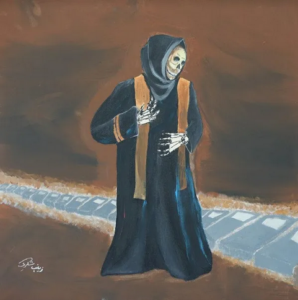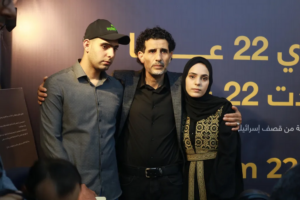I told Israelis about the tragedy of one Gazan woman. The audience was shocked

A painting from Zainab al-Qolaq’s exhibition ‘I Am 22. I Lost 22 People’
Sheren Falah Saab writes in Haaretz on 16 July 2024:
It was a relatively quiet night in early May, 2023. I had been invited to talk about the future through the mirror of art at a cultural event in Tel Aviv. I thought a great deal before preparing the lecture, and intuitively decided to talk about the future in conflict and war zones, specifically the Gaza Strip.
I told the story of artist Zainab al-Qolaq. Her life changed completely on the night of May 16, 2021. That night, Israel bombed the center of Gaza City during Operation Guardians of the Wall, and 22 members of her family were killed, including her brother, her sisters and her mother. Al-Qolaq herself was trapped under the rubble for 12 hours, without knowing what had become of them. Since then, she has kept silent, and for a year, she painted the loss she suffered. I realized that Israelis are afraid to find out that human beings live in Gaza, young women like Zainab al-Qolaq.
Al-Qolaq, who is 24, studied English and literature at the Islamic University in Gaza. The pressure of her studies, she later said, led her to look for ways to express herself. “That’s how I found myself painting,” she said in an interview with the Palestinian television channel Al-Quds. “There is no future for art in Gaza, but nevertheless, I painted, in a manner that even surprised myself. And slowly, it developed.”
Her paintings show members of her family with incomplete faces, in gloomy colors, sometimes in their graves, and other images that recall their death. That evening, I showed her paintings to the audience. Effectively, I brought Gaza’s suffering into Tel Aviv. I read her words aloud. I wanted Israelis who have never heard about Gaza to know about the lives of the Palestinians on the other side of the fence – about the suffering of Al-Qolaq, who had she lived elsewhere would have been a flourishing artist by now.
“Do you want me to tell you what happens when an entire building collapses with people inside it?” she wrote on her personal X account. “How is it possible to tell you about my hours under the rubble, as I screamed and begged for help? Even the stones of the house wept with me. Or to tell you about the moments before the explosion, when my family ran to the stairwell and the entire building shook?
“Should I tell you about the sharp transition between feeling safe with my family and then the struggle for life and the encounter with death? Have you thought for a moment about being in my place and imagining how it would be to survive and discover that I had lost my entire family – my mother, my sister, the whole family? I can’t remember all that time under the rubble. But the great tragedy was after they rescued me and I discovered what I had lost.”
I remember that I read Al-Qolaq’s words aloud and my voice choked up. I held my breath to keep from crying. Writing for readers isn’t like speaking out loud. The latter demands a different kind of effort. And when the words have been spoken and resound in space, they have a different significance. That’s exactly what happened after I finished speaking. I looked at the audience, at their surprised faces, at the shock they suffered at that moment. And what I saw in their eyes was fear of the truth.

Zainab al-Qolaq with her father and brother.
At that moment, when I realized that Israelis are afraid to find out that human beings live in Gaza, young women like Zainab al-Qolaq – that she is very talented, that she had dreams, and that they were severed at the root. The war destroyed her life. That is the difficult, bitter truth. But I saw with my own eyes how difficult it was for the audience at this event to digest her tragic story.
I drove home from Tel Aviv to my village, and cried the whole way. Because for the first time, I had personally experienced the depth of Israelis’ denial about residents of the Gaza Strip. They treated my remarks as if I were a visitor from another planet, and Gaza as if it were on Mars. They didn’t really understand (or want to understand) the existential meaning of being a Gazan – living under siege, suffering from every war, with the chance of losing one’s family so high.
The current war has merely sharpened what I already knew about Israelis’ lack of desire to recognize the Palestinians’ existence and experience – especially if they are Gazans. Since the war began, I have been covering the humanitarian situation in Gaza. There are times when I go over the list of the dead and am torn up inside. I cry when I’m alone. Entire families have been erased – mothers, children, grandfathers and grandmothers. My heart is wrung.
How do you tell all this to an Israeli audience that is immersed in itself? One that has no real intention of knowing what is happening on the other side of the fence? How do you crack the wall of Israeli denial? Every time I stand there and ask myself those questions, without finding a single correct answer.
Sometimes I hesitate to watch the Israeli news broadcasts (on any channel, with no exceptions), because it deepens my despair as a journalist. Gaza doesn’t exist in the Israeli mainstream – not in the news, not in Israelis’ daily conversations, not in cultural events, and not at the decision makers’ table. This is one of the cruelest and harshest forms of dehumanization.
How many Israelis know Zainab al-Qolaq’s story? Or the stories of the Palestinians who have lost their families in the current war? How many Israelis are willing to admit that this war has lost its justification and is only deepening the fear of death that hovers over Gazans?
Lives, desires and ambitions
Recognizing that Gazans exist as flesh and blood and seeing them as human beings who have lives, desires and ambitions are things that never even enter the heads of average Israelis. Scrolling through Israeli feeds on X or TikTok is all you need to do to discover the various forms of dehumanization, whether it’s ridiculing and aping Gazans, or soldiers photographing themselves in women’s underwear after breaking into Gazans’ homes, or the various forms of denial of the scope of the destruction and tragedies occurring in Gaza due to the prolonged bombing campaign.
“There are no innocents in Gaza.” This sentence has become part of the Israeli consensus, heard in every conversation, in order to cleanse Israelis’ conscience. This is one of the greatest moral failures – the fact that Israelis perceive Gazans’ reality through a filter supplied by some other Israeli, usually through a security prism.
Only a few kilometers separate Tel Aviv from Gaza, but my desperate efforts to give Gazans a voice – time after time, both before and after October 7 – have gotten a cold shoulder. Yet the ability to feel compassion and empathy for suffering is a vital value, one that is unique to the human experience.
The current war is a continuation of a moral failure that already existed. And my deepest fear is that Israelis are going down a one-way street from which there is no return – that they will permanently lose their ability to feel compassion for the Palestinians, especially in the Gaza Strip.
This article is reproduced in its entirety
